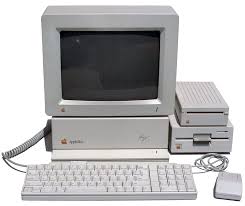I remember the moment in time when I learned how to copy and paste.
My parents bought our family an Apple IIGS when I was in junior high school. It was our first personal computer. It was the device on which I learned to word process.
As early I can remember, I wrote stories. I filled journals and spiral-bound notebooks. But access to this device changed me. It changed my writing. I developed skills formerly unknown to me. I needed those skills to adjust to the medium. I wrote more fluently. I mastered keyboarding. (Shockingly without the use of a formal typing program, I was just motivated to learn to type fluently so I could write and create, go figure.)
When I hear, “It’s not about the technology, it’s about what we do with it,” I agree and disagree. It’s not about the tool specifically. But it is. It’s about how it changes us. How it changes the process. The product. The questions. The answers. How we find information. How we learn to understand what is relevant and real and what is crap. These shifts are because of the technology. Because of the tools with which we choose to interact.
It’s about what it can help us become. More fluent writers. Risk-takers. Creators. Sharers. Activists. Educators. Learners.
It’s about how it can help us help others. How it gives voice to the voiceless. How it brings people together in times of adversity and in times of celebration.
To deny our students of discovering who they could become… how they could invent… how they could make an idea or thing come to life… that isn’t okay, especially not if it’s just because we’re too busy with test prep or traditional models of classroom instruction or doing things as we’ve always done because that’s how we do it. That doesn’t allow for the kind of autonomy and questioning and discussion and reinventing that our kids deserve.
It’s about the choices we make with technologies. About how we choose to use them to communicate. To publish. To interact with others. Our kids deserve the chance to make those choices. To understand those choices. To have guidance with those choices.
It changes our present, it changes our futures.
Being a connected educator has changed me. It has caused me to understand things I never before understood. It provides a glimpse into the perspectives of people and groups of people that in my unconnected life I did not previously know.
But after years of connecting, it’s caused me to become jaded, too. I’m not likely to become easily excited about a new tool. I cringe when I hear the words “personalized learning” used in conjunction with technology and schools and children. Children.
So, it is about the tools. It’s about how they change us. It’s about how we are vulnerable when learning about the roles they can and should play in our lives. In our kids’ lives. So we should help them learn and take command of the tools. To create, not just consume. To interact significantly and meaningfully and respectfully. And we should act on their behalf when systems or companies or organizations or people try to impose uninspired, one-size-fits-all uses for technology.


You’re not jaded at all. Your experience has led you to the point where you know that there are no technologies that are “game-changers.”
Great post Lyn. I think that you make some really good points. I could not agree more that it is about the ‘choices’ that we make. With this I guess that it needs to be released that no choice in regards to technology is actually still a choice. In a different take on things, I really like Bill Ferriter’s critique on SAMR where he suggests that technology does not redefine learning, rather it makes it more ‘doable’ (http://blog.williamferriter.com/2014/04/27/do-we-really-need-to-do-new-things-in-new-ways/). At the end of the day I do not think that ‘technology’ and ‘learning’ are mutually exclusive, but better considered a part of a symbiotic relationship.